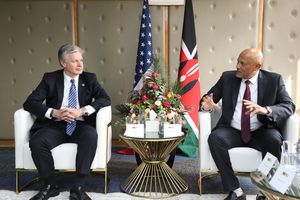
Renson Mulele Ingonga, the Director of Public Prosecutions.
Director of Public Prosecutions, Renson Ingonga, has scored a win in the prosecution of two people implicated in the 2019 terror attack at the Dusit-D2 Hotel Complex.
This was after the High Court allowed the prosecution to use electronic evidence extracted from the mobile phones of two accused persons.
High Court judge Dorah Chepkwony on Monday ruled that even though the evidence was obtained without the court's permission, it was in the public interest to allow the evidence given the special circumstances and the nature of the case.
“Therefore, the nature and severity of the alleged offence, particularly those related to terrorism, necessitates a careful balance between the protection of individual rights and the imperative to safeguard the public from existential threats and dangers,” the judge said.
The judge made the ruling in an appeal filed by the prosecution after the trial court last year rejected the use of the evidence on the grounds that it was obtained illegally and in breach of the right to privacy.
Two accused persons – Hussein Mohamed Abdille and Mohamed Abdi Ali – are facing terror-related charges over the January 15, 2019 attack, in which more than 20 people were killed and scores injured.
A third accused person, Mire Abdulahi Ali, pleaded guilty to offences of cyber-terrorism contrary to section 33 of the computer misuse and cybercrimes, forgery and illegally obtaining Kenyan identity documents.
He was sentenced to four years imprisonment, which he has served.
During the trial, the prosecution called a total of 45 witnesses and was about to close its case when it obtained evidence from the accused persons' mobile phones.
Acting Deputy Director of Public Prosecutions Michael Sang told the court that the prosecution wanted to recall Chief Inspector Joseph Kolum, a digital forensic expert, to provide the electronic evidence.
The application, however, was opposed by the accused persons through their lawyer Chacha Mwita.
In a ruling in February last year, Justice Diana Kavedza (then Kahawa Chief Magistrate) dismissed the prosecution’s plea, forcing the DPP to appeal.
The prosecution said investigators analysed about 177 mobile phones.
Further, Mr Sang submitted that it was the mobile phones that led to the arrest of the accused persons and that the evidence was obtained with the consent of the accused.
The prosecutor admitted that they had not obtained a court order to search the devices, but that the defendant had voluntarily handed over the mobile phones to investigators and provided the passwords without any form of coercion.
Mr Sang said Section 25 of the Criminal Procedure Code and Section 31 of the Prevention of Terrorism Act allow police to search an arrested person as well as items found on them as long as it is demonstrated that there is imminent danger or harm.
The prosecution added that the ruling was erroneous as it had the effect of putting national security at risk and also interfering with the ongoing criminal trials.
Mr Mwita objected to the production and use of the evidence, arguing that the search was conducted without a warrant.
The lawyer said the evidence had been obtained illegally and was inadmissible and it would be prejudicial to them and render the administration of justice unfair.
The judge ruled that while the right to privacy is fundamental, it is not absolute and can be limited under circumstances.
“Upon considering the arguments by counsel for the parties, alongside the applicable laws and jurisprudence, the court finds that the admission of electronic evidence obtained without a warrant is justified under the circumstances of this case,” said the judge.









